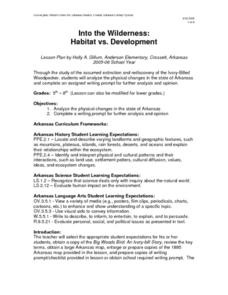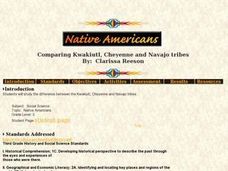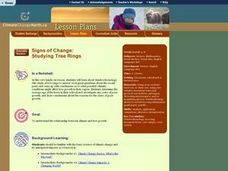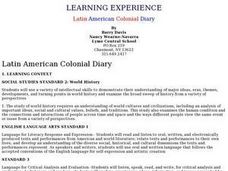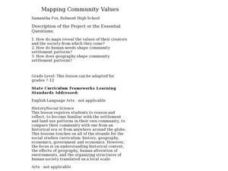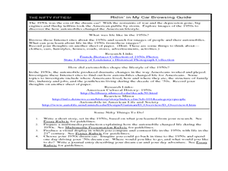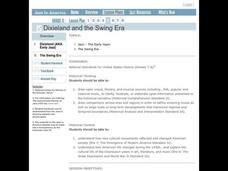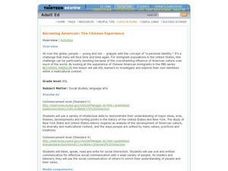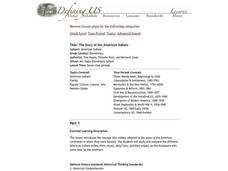Curated OER
Ka'ianaa'ahu'ulu: A Leader of Hawai'i
Students evaluate leadership traits in 18th century Hawai'i and modern times. In this leadership skills lesson plan, students identify leadership traits and read the story of Ka’iana. Students monitor the leadership activities of a...
Curated OER
Into the Wilderness: Habitat vs. Development
By studying the once-assumed extinction, then rediscovery of the Ivory-Billed Woodpecker, learners look at the physical changes that have occured in habitats throughout Arkansas. This outstanding lesson is chock full of terrific...
Museum of Tolerance
And Justice for All? Slavery Not Just in the Past
Slavery in India, Sudan, and Mauritania? What about in the United States? Groups research modern slavery in these four countries, collecting factual evidence (What), determine their feelings about this evidence (So what),...
Curated OER
From Curiosity Cabinet to Museum Collection
Students study binomial nomenclature and museum-based research. They create a curiosity box, label the objects in their curiosity box , develop a classification scheme for the objects, and create a database of all objects collected by...
Curated OER
Comparing Kwakiutl, Cheyenne and Navajo tribes
Third graders study the difference between the Kwakiutl, Cheyenne and Navajo tribes. They identify the people, resources, lifestyle and beliefs of the Kwakiutl, Cheyenne, and Navajo Indians. Afterward, they present their projects on each...
Curated OER
Signs of Change: Tree Rings
Students identify and experiment with dendrochronology (the study of tree rings to answer ecological questions about the recent past) and come up with conclusions as to what possible climatic conditions might affect tree growth in their...
Curated OER
Latin American Colonial Diary
Students examine the class systems of New Spain. In small groups, they create a five-day diary about the family life, food, occupation, and government involvement of an assigned personality from the time of Colonial Latin America.
Curated OER
Tread Lightly: Where We Stand
Students explore the concept of ecological footprints. For this environmental stewardship lesson, students calculate their ecological footprints and consider how to reduce them.
Curated OER
Local and Global Sustainability Unit
Students examine the characteristics that define a sustainable community at the local and global level. They create and prioritize a list of traits, read and discuss a magazine article, and create a poster.
Curated OER
Mapping Community Values
Students discuss the origin of various maps focusing on the values behind them. Students also explore how human needs and geography influence community settlement patterns. Students extend learning by creating and mapping their own ideal...
Curated OER
Debt Slavery and Children in India, A Case Study
Students examine the child labor situation in India. Using the internet, they research the conditions these students work under and how they are part of the debt slavery system. They read the Human Rights Watch and determine if this is...
Curated OER
Jazz in America
Students learn vocabulary associated with the Swing Era. They also listen to music from the time period.
Curated OER
Sybil Ludington's Ride - a poem
Fourth graders examine the role a teen from the Hudson Valley played in the American Revolution. They view the map of Sybil's ride and calculate the distance using the map's legend.
Curated OER
Wings, Chrome, and Tailfins: Automobiles of the 1950s
Students study the automobile industry. In this cultural history instructional activity, students explore 1950s America as they view a teacher-created PowerPoint presentation regarding the 1950s. Students research how the automobile...
Curated OER
Political Cartoons
Students examine a variety of historical cartoons. They recognize a political cartoon and identify the main idea, symbolism, exaggeration and caricature in political cartoons. Students analyze a political cartoon by Benjamin Franklin.
Curated OER
Jazz in America
Students explore the Swing Era and its implications. They answer questions and listen to music from the era.
Curated OER
To Be Black and American: The Great Depression
Twelfth graders view pictures and write a description of what is depicted in the picture. They then divide into groups of three to share what they have written and come to a consensus of what the picture represents.
Curated OER
With Liberty and Justice for All
Learners examine the role of Supreme Court justices. In this judicial branch lesson, students consider the civil rights and civil liberties as they investigate Minersville School District v. Gobitis (1940) and West Virginia State Board...
Curated OER
Technology Blackout Day
Students describe the impact of modern technology inventions on daily life. They create a graph of the class's favorite item of technology and draw a picture of their favorite piece of modern technology.
Curated OER
We Are The Freedom Riders
Students consider the role of the Freedom Riders. In this American Civil Rights lesson, students watch videos, listen to lectures, and conduct research regarding the participants in the Freedom Ride protest. Several weblinks, worksheets,...
Curated OER
Becoming American: The Chinese Experience
Students examine the experience of Chinese American immigrants in the PBS series BECOMING AMERICAN. ESL learners investigate and explore their own identities within a multicultural context.
Curated OER
American Indians
Learners research early Indian adaptations in this activity. They research the different American Indian tribes. They also research and compare the tribes' rituals, daily lives, and their impact on the Europeans who came later to the...
Curated OER
Biography of the Millennium: 100 People, 1000 Years (4 Parts)
Students explore who are the most influential people of the past thousand years.
Curated OER
Technology: Rating Inventions
Third graders brainstorm a list of inventions used daily. They use Kidspiration to create a web with inventions in the middle. Students choose three inventions from the web and rank them according to interest.



